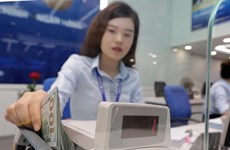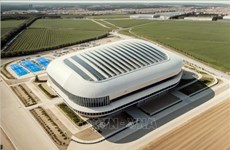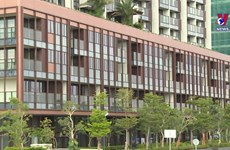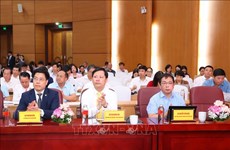Da Nang set to achieve robust maritime economic growth
The central coastal city of Da Nang has issued a planning for the economic development of sea and island areas to 2020 with the aim to optimise the locality’s strength and potential to create socio-economic development breakthroughs.
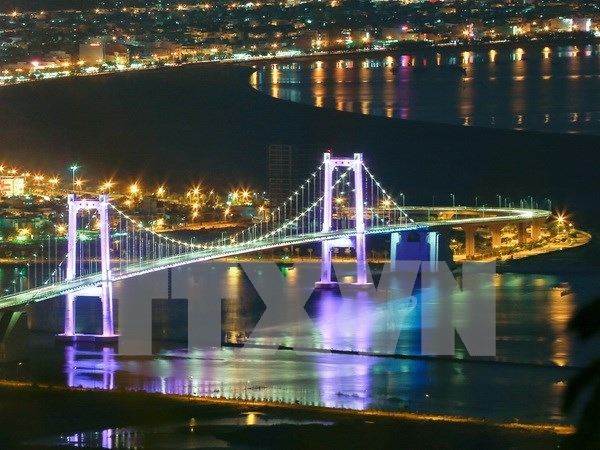 Da Nang city (Photo: VNA)
Da Nang city (Photo: VNA)Da
Nang (VNA) – The central coastal
city of Da Nang has issued a planning for the economic development of sea and
island areas to 2020 with the aim to optimise the locality’s strength and potential
to create socio-economic development breakthroughs.
The planning, seen as part of the city’s efforts to realise Vietnam’s sea and island strategy to 2020, also clarifies prioritised areas and projects for both local and foreign investments in sea and island areas.
Da Nang is among the 28 coastal localities of Vietnam and one of the 14 central cities and provinces having the coastline. Six out of its eight districts border the sea. The city has 90km of the coastline and 80 percent of population living in coastal districts and wards.
Thanks to its wide sea area, Da Nang city has high potential in fishery, tourism and sea transportation.
The city’s sea has a fishery reserve of about 1.14 million tonnes, accounting for 43 percent of the country’s total, with more than 670 species, including 110 species with high economic values.
The south Hai Van-Son Tra peninsular area is home to a diverse ecosystem, including coral reefs, sea grass, seaweeds and rare creatures and plants.
With a goal to become a fishery centre of the central region posting a 14-15 percent growth in seafood exports per year, Da Nang has set to focus on offshore fishing and minimize near-shore fishing activities in a bid to restore and preserve fishery resources. The city aims to rapidly expand the fleet of offshore fishing vessels with high capacity and upgrade those with small capacity.
The city has paid much attention to vocational training to provide high quality workforce with skills and knowledge needed to operate modern fishing equipment to serve the fishery sector.
At the same time, Da Nang has invested in a fleet of 10 fishery logistic vessels with a capacity of 800-1,000CV each, thus supplying fuel and at the same time buying fresh seafood at sea. It fishermen are being supported by modern communication information system when operating at sea.
To improve catch output and minimize human and property losses during operations at sea, the city has issued a regulation on fishermen’s teams that laid the foundation for the activity of gathering individuals to an organization in which members help each other in production as well as in search and rescue activities, safeguard the traditional fishing grounds, assist each other in the procurement of fishing tools and equipment, connect vessels, maintain contacts between fishermen at sea and the mainland, and receive weather forecast and guidelines on disaster response and search and rescue from the mainland.
The model has been lauded by local fishermen who found that the groups meet their demands during their production at sea.
Vu Dieu Ngan from the Da Nang Institute for Socio-economic Development Research said that to make the maritime economy play the core role in the city’s economy, Da Nang should focus on strengthening fishing activities, especially offshore fishing, while continuing improving the capacity and effectiveness of the sector.
She also stressed the importance of increasing the application of science and technology as well as quipping modern equipment for fishing vessels.
The city should expand the seafood processing system for exports, while upgrading Da Nang port to ensure its performance as the gateway to the sea for the Central Highlands as well as Laos, Cambodia, Thailand, Myanmar and other northeastern Asian countries, said Ngan.
Meanwhile, Dan Hung from the municipal People’s Committee said that the city has exerted efforts to implement commitments to the development of the maritime economy, while resolutely safeguarding the country’s sovereignty over sea and islands.
The city has built its own strategy to realize the country’s sea and island strategy, with solutions and steps suitable to the country’s conditions while making the best use of foreign investment and technology to conquer the sea, serving the country’s economic development in a rapid and sustainable manner, said Hung.-VNA
The planning, seen as part of the city’s efforts to realise Vietnam’s sea and island strategy to 2020, also clarifies prioritised areas and projects for both local and foreign investments in sea and island areas.
Da Nang is among the 28 coastal localities of Vietnam and one of the 14 central cities and provinces having the coastline. Six out of its eight districts border the sea. The city has 90km of the coastline and 80 percent of population living in coastal districts and wards.
Thanks to its wide sea area, Da Nang city has high potential in fishery, tourism and sea transportation.
The city’s sea has a fishery reserve of about 1.14 million tonnes, accounting for 43 percent of the country’s total, with more than 670 species, including 110 species with high economic values.
The south Hai Van-Son Tra peninsular area is home to a diverse ecosystem, including coral reefs, sea grass, seaweeds and rare creatures and plants.
With a goal to become a fishery centre of the central region posting a 14-15 percent growth in seafood exports per year, Da Nang has set to focus on offshore fishing and minimize near-shore fishing activities in a bid to restore and preserve fishery resources. The city aims to rapidly expand the fleet of offshore fishing vessels with high capacity and upgrade those with small capacity.
The city has paid much attention to vocational training to provide high quality workforce with skills and knowledge needed to operate modern fishing equipment to serve the fishery sector.
At the same time, Da Nang has invested in a fleet of 10 fishery logistic vessels with a capacity of 800-1,000CV each, thus supplying fuel and at the same time buying fresh seafood at sea. It fishermen are being supported by modern communication information system when operating at sea.
To improve catch output and minimize human and property losses during operations at sea, the city has issued a regulation on fishermen’s teams that laid the foundation for the activity of gathering individuals to an organization in which members help each other in production as well as in search and rescue activities, safeguard the traditional fishing grounds, assist each other in the procurement of fishing tools and equipment, connect vessels, maintain contacts between fishermen at sea and the mainland, and receive weather forecast and guidelines on disaster response and search and rescue from the mainland.
The model has been lauded by local fishermen who found that the groups meet their demands during their production at sea.
Vu Dieu Ngan from the Da Nang Institute for Socio-economic Development Research said that to make the maritime economy play the core role in the city’s economy, Da Nang should focus on strengthening fishing activities, especially offshore fishing, while continuing improving the capacity and effectiveness of the sector.
She also stressed the importance of increasing the application of science and technology as well as quipping modern equipment for fishing vessels.
The city should expand the seafood processing system for exports, while upgrading Da Nang port to ensure its performance as the gateway to the sea for the Central Highlands as well as Laos, Cambodia, Thailand, Myanmar and other northeastern Asian countries, said Ngan.
Meanwhile, Dan Hung from the municipal People’s Committee said that the city has exerted efforts to implement commitments to the development of the maritime economy, while resolutely safeguarding the country’s sovereignty over sea and islands.
The city has built its own strategy to realize the country’s sea and island strategy, with solutions and steps suitable to the country’s conditions while making the best use of foreign investment and technology to conquer the sea, serving the country’s economic development in a rapid and sustainable manner, said Hung.-VNA









